#central prison farm
Text

"GIRLS PLOW AND GROW STRONG ON THIS FARM," Toronto Star November 11, 1913. Page 5.
----
Introduced to Velvet Side of Hoe at 5 a.m. to Take Hysteria From the Cabbage.
---
THE SLEIGHTON FARM
----
President Makes Some Comments on the Recent Anti-Suffrage Address by Mrs. George.
----
"We will solve the hired man problem by having hired women," said Mг. Findlay, superintendent of the Ontario Prison Farm, in the course of a brief address to the Equal Franchise League in Margaret Eaton School last evening. The address followed an exhibition of views illustrating the Sleighton Farm for Delinquent Girls of Pennsylvania, which were to have been shown by Mrs. Falconer, the superintendent. Regrets were received from Mrs. Falconer, that inasmuch as some German commissioners on a tour of inspection were visiting her farm, she was unable to leave on the date arranged.
The pictures, however, were a lecture in themselves, and at the same time a prod to the slowly wakening Ontario, as to the sane method dealing with delinquent girls. of Girls plowed with horses and real plows: they stood up on hay rows with knickerbockered gymnasium suits and tossed hay with forks, they fussed up big beds of cabbages, fed small pigs, which insisted on climbing into the pails headfirst; they sewed and ironed, and baked broad which rose in pans before the eyes of the camera. They had a baseball team and diamond, with rooters attached; gala days when the corn husking time arrived, and each group of girls adopts a different costume: a prize being won by the most artistic. And in the corners of the snake fences each girl has made her own small garden, which in its rivalry is so fearfully tidy that a worm would wipe its feet carefully on a burdock before entering.
Honor Cottages.
The buildings are artistic stone cottages with large colonial verandahs and vines, wherever a vine can cling. There is the Reception Cottage, in which the new girls live for the first three months of their stay. They ar- rive with hot rebellion in their eyes, and an empty, hysterical longing for the artificial life from which they have been torn. Here they learn to settle their wings quietly down and rest, until they are in condition to be promoted to an "Honor Cottage."
Each cottage is a unit, self-governing and self-sufficient. This system provides the necessary rivalry, from ball-teams to fattest chickens, and lightest bread. The girls in the Honor Cottages are allowed a great deal of freedom, which they seldom abuse. When a girl has repeatedly abused her freedom, she is for the time being ostracizer, which is most effective. Since its inception some ten years ago, 6.000 girls have passed through the training, and except in a few instances, they are living good and useful lives, some loving their foster home to the extent of bringing their prospective husbands to the superintendent for Inspection.
Mr. Findlay told of his intense indignation when traveling through Normandy, to see women home from the fields with coming heavy farming instruments, until a native of the country asked him to compare the health of body and mind of our own girls who spend their days in factories.
Hysterical Cabbages.
"Farm life is a great cure for hysteria," he added. "To be roused by the fey, uncompromising voice of the alarm clock at five in the morning, Introduced to the soft, velvet side of a hoe, and told to go out and take the hysteria out of some cabbage patch. I tell you, the tight skirts our girls are wearing wouldn't have much show with those Norwegian women, but when you think of the old Greek models, those same Norwegians have all the honors coming to them."
Mr. Findlay was applauded by all the Equal Franchisers when he announced that the purchase of a jail farm for women in Ontario was to be completed as soon as he had selected the site, for which he had been looking that afternoon.
"One of my men out at the farm was sitting on the step after his day's work." he related, "looking out over the fields, and he remarked, It's all right for us men, but they should get a place like this for the women back there."
Hitting the Antis.
In opening the meeting, Mrs. L. A. Hamilton, president of the league, commented briefly on the address given recently by Mrs. George before the Anti-Suffrage Association.
"Mrs. George's address was destructive," said Mrs. Hamilton, "and not at all constructive, I fear she is not only anti-suffrage, but anti-social. The great motif of the suffrage movement is its intense loyalty to other women. We regret that Mrs. George cast a slur on policewomen. We regret it on account of our common womanhood, and on account of Mrs. Alice Stebbins-Wells. We also regret it on account of our own policewomen who are present, but are too modest to come to the platform."
Commissioner Starr, of the Juvenile Court, closed the meeting with a few instances of the men who had returned to thank the authorities for the chance given them to recover lost manhood when sent to the prison farm. "What is good for men is good for women, and what is good for men and women is good for boys and girls," he concluded.
#toronto#guelph reformatory#sleighton farm#delinquent girls#prison farm#farm labour#women in the toils#youth detention#juvenile court#young delinquents#youth delinquency#central prison farm#middle class reformers#suffrage movement#women's suffrage#women in politics#liberalism feminism#crime and punishment in canada#history of crime and punishment in canada#pennsylvania history#penal reform
0 notes
Text
Palestinians from several of the displaced communities described the same pattern to +972: Israeli settlers arrive with their herds and prevent them from grazing on land where Palestinians have grazed for decades; then armed settlers would proceed to harass them day and night, even entering houses, without the army or police intervening. Everyone described the same, overwhelming feelings of fear and distress under the shadow of these settler invasions.
“It’s like 1948,” said Mohammed Hussein, a resident of Ein Samia — invoking the year of the Nakba (“catastrophe”) and the expulsion of hundreds of thousands of Palestinians from their homeland during Israel’s establishment.
According to the Palestinian residents, the situation grew worse following the establishment and growth of several grazing settler outposts in the area in recent years; settler violence and further expansion also noticeably escalated since the current Israeli government, led by extremist far-right parties, was sworn in last December.
... The Israeli authorities, along with the settlers, have played a central role in the displacement. For years, the occupation apparatus has banned the Palestinian communities from construction; demolished their homes; denied them connection to water and electricity; stopped them from paving roads; issued demolition orders for schools built with funds from the European Union; established and recognized Jewish settlements; and, of course, stood by during settler violence.
... “We have always been under occupation, in a prison with checkpoints, but now we live in a prison van,” said Ali Abu al-Kabash, 60, sitting in a tent he had set up in an open area across the Allon Road. Abu al-Kabash, who is originally from a-Samu, near Hebron, moved to the Ramallah area in the 1980s, and to the area near Ras a-Tin in 1995.
“Before the [last] election, the settlers would run away if there were a few of us [facing them]. Today, they attack because the government is with them. The police, the army, and the Shin Bet are all with them,” he added.
“For 25 years we lived a normal life,” Abu al-Kabash continued. “In recent years, the settlers came and established two outposts [Micah’s Farm and Malachei HaShalom]. They blocked the road between us and Ein al-Rashash, and the one that goes down toward Fasayil. We would herd in the area, but they came to us in the name of the government and the Civil Administration and said that the land belongs to the settlers. They brought sheep to eat the food we grew for our sheep … They enter houses, sometimes with many soldiers, taking photos, even when there are girls, women, and old men present.”
According to Abu al-Kabash, the violence increased after the Muslim holiday of Eid al-Fitr in May. “They park at the entrance of the homes. Some of them are under 12 years old, under the age of criminal responsibility. They go in, look in the refrigerator, or at our phones. What can we do? They want Area C for Israel, to take control of the land through the settlers, but without war. But where will we go? The occupation is everywhere.”
Ras a-Tin, which neighbors al-Qabun, was subjected to similar harassment and severe violence by settlers. On the day its residents fled, in July 2022, Ahmad Kaabna, the mukhtar of Ras a-Tin — who died suddenly in early August at age 60 — told a group of activists: “The settlers frightened the women, the children — everyone. They came to the homes at night in groups of 10-15 people … the army with them. If you talk to them and say ‘get away, get out of here,’ they call the army or the police, who come and arrest the young [Palestinians].”
349 notes
·
View notes
Text
Character Spotlight: Kai Winn Adami
By Ames
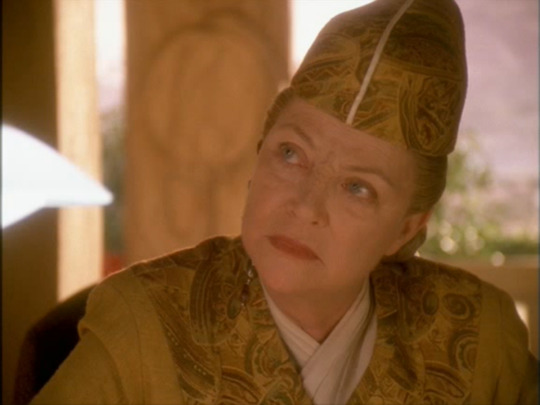
So far, all of the subjects of our spotlight series have been people for whom we’ve had both good and bad character moments to discuss. But what do you do when you’re highlighting an antagonist character? For a villain, being bad is actually very good and that’s so perfectly the case for Kai Winn Adami. So this time A Star to Steer Her By will simply feature a bunch of our favorite moments overall.
Boy, do we love to hate this bitch. Somehow she’s only in 14 episodes even though it feels like she’s always looming somewhere with a passive-aggressive gaze and a “my child” on her lips. Louise Fletcher plays this power-hungry religious icon with such depth and nuance that it was easy for us to come up with a ton of favorite moments. So flip open the Book of the Pah-wraiths below to check them out, listen to our Bajoran chanting over on this week’s podcast (jump to 1:12:58), and walk with the prophets, my child.
[Images © CBS/Paramount]
Favorite moments
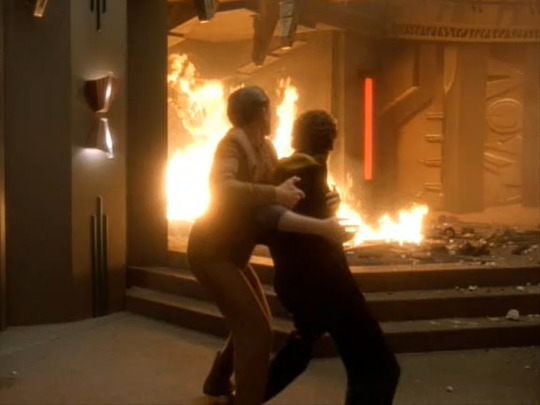
The Bajoran Scopes Monkey Trial
Winn makes a big impression in her very first appearance in “In the Hands of the Prophets” when she’s displaying big Karen energy while challenging why Keiko isn’t teaching Bajoran religious ideology in a public school. And she does it with a smile. And also with a can of gasoline since she surely got that school blown up in one smokin’ power move.
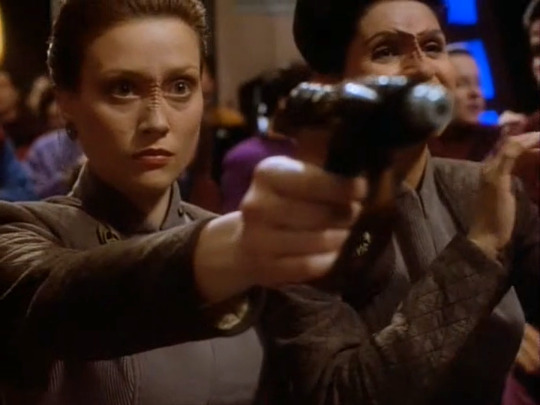
The sacrifices the Prophets call on us to make are great sometimes
Somehow there are even more layers to “In the Hands of the Prophets” than teaching religion in classrooms and committing arson. Winn also puts Neela up to assassinate Bareil so that she can work on amassing power. And when Neela fails to secure a getaway plan, Winn straight up declares that’s fine with her. What does she care as long as her hands stay clean?
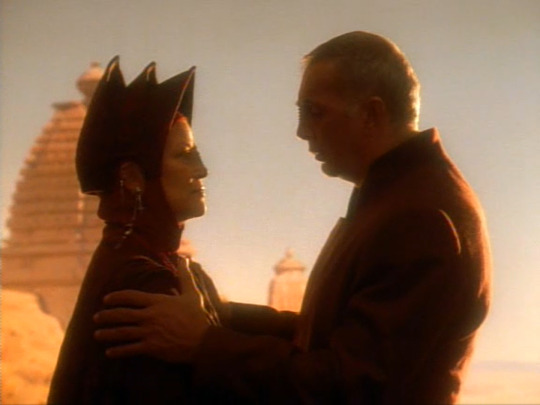
We’re a match made by the Prophets
Winn continues to keep her hands clean in “The Circle.” Even while covertly supporting the Bajoran extremist faction, the Alliance for Global Unity, and bedding down with Minister Jarro Essa, Winn manages to direct blame away from herself when their plans have been exposed and gone thoroughly sideways. Jarro can only watch his downfall from under the bus.
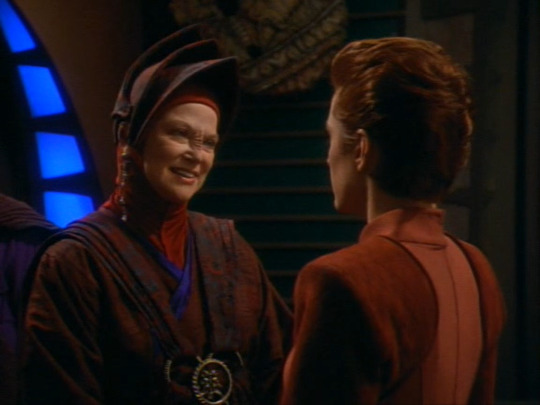
You will never speak to me with such disrespect again!!
Kai Winn’s “my child” may sound like a catchphrase, but it’s always delivered with such emotion which Fletcher was so good at. When Kira’s been sniffing around how Winn extracted information from Kubus Oak in an attempt to get Bareil out of the kai election in “The Collaborator,” the soon-to-be kai sends chills down your spine with her cold threats.
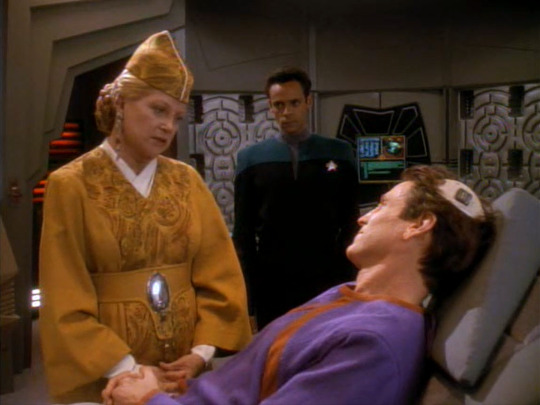
He’s more machine now than man
When Bareil’s health keeps failing in “Life Support,” Winn pushes to keep him cognizant as long as is convenient for her. All she wants is the credit for his negotiations with the Cardassian Central Command while also keeping open the option to use him as a scapegoat should things fail. This woman plays her cards so strategically that she always comes out on top.
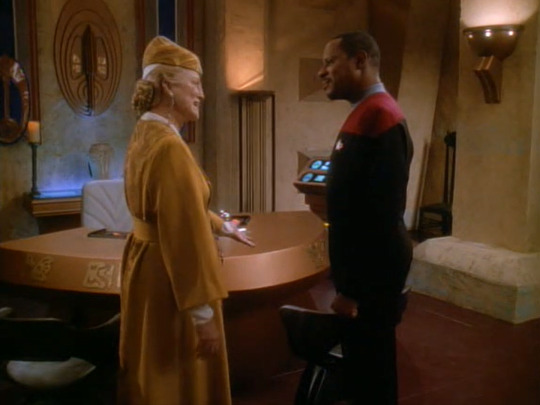
See ya later, reclamator
To make a good political statement by getting some soil reclamators to Rakantha Province, Winn ends up sending in the Bajoran Militia after Shakaar’s resistance cell in “Shakaar.” And what’s more, she’s presumptuous enough to ask Sisko to send in Starfleet security or else she’ll pull out of Federation membership talks! All for farming equipment. Well that escalated quickly.
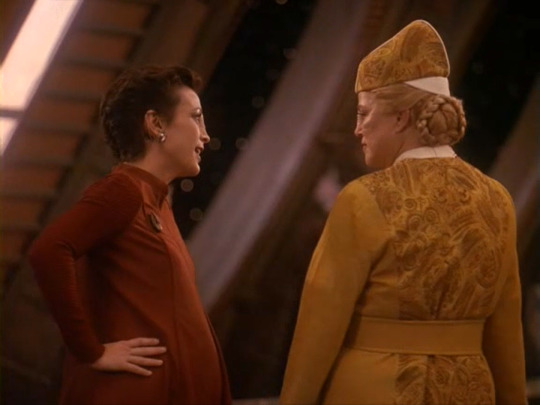
You think you’re the only ones who fought the Cardassians
We learn just what Kai Winn was up to during the occupation, and it’s surprisingly humanizing. Winn throws in Kira’s face during “Rapture” how she was put in a Cardassian prison camp for five years, and never stopped preaching about the prophets despite the beatings. And per “‘Til Death Do Us Part,” she also sold gemstones from the tabernacle to bolster the resistance.
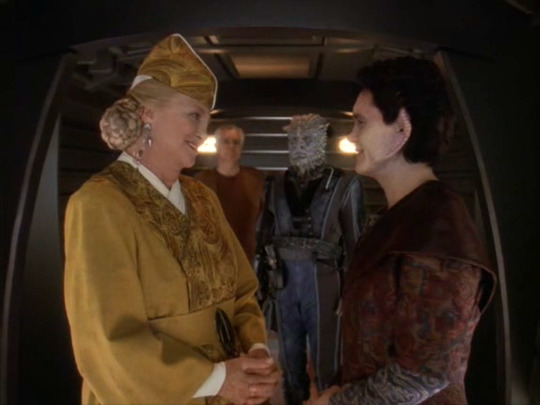
No. We are nothing alike. Nothing at all.
What could be better than a Louise Fletcher–Jeffrey Combs scene? We get just that in “In the Cards” when Winn is trying to delay the decision between allying with the Federation or the Dominion because in either scenario her backwards little planet will get stomped on. But it’s her short scene with Weyoun that takes the cake when she reads his pagh and judges him hard!
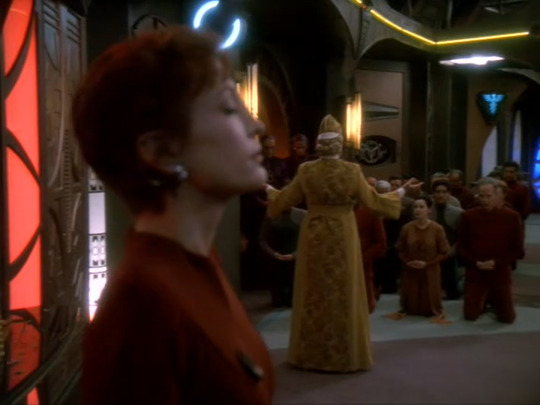
Please leave your message for the Prophets at the beep
There’s plenty for Winn to be judgmental about in “The Reckoning” when Sisko borrows an ancient tablet without asking and then destroys it utterly. But at the core of Winn’s motivation is desperation for the Prophets to communicate with her, which they’ve never done, so she puts an end to the Prophet–Pah-wraith battle because she isn’t the center of attention for once.

The Password Is: Restoration
Winn’s whole arc in the final ten-parter of the series is a work of art, and so perfectly portrayed. Let’s break it down here, because it all starts with getting fully taken in with Anjohl Tennan in “‘Til Death Do Us Part.” All Dukat-in-disguise has to do is drop some buzzwords and the Kai is immediately enamored with the guy, and bedding down with him by the next episode, “Strange Bedfellows.”
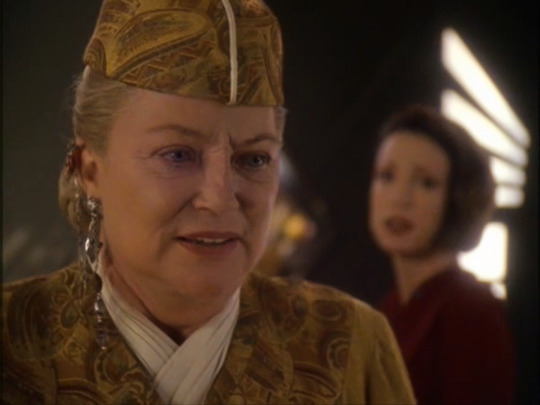
Everything will change once you step down as Kai. You’ll see.
When Winn is having a crisis of faith in “Strange Bedfellows” after receiving a vision from the Pah-wraiths, she wisely seeks out Kira. And the Corporal gives Winn the perfect advice to step down as kai so as not to be tempted by power anymore. And for a split second you think Winn will listen to reason. But she’s still Winn, after all, entirely blind to what she doesn’t want to see.

Catfished by the Prophets
Stepping down as kai is not an option for Winn, who doesn’t believe she has too much power. In fact, she believes she doesn't have enough power! So by the end of “Strange Bedfellows,” she fully denounces the Prophets because they’ve never done anything for her. She admits to Anjohl that she’s never felt their presence and has been faking it for years, but blind faith will serve her no longer. Now she wants results!
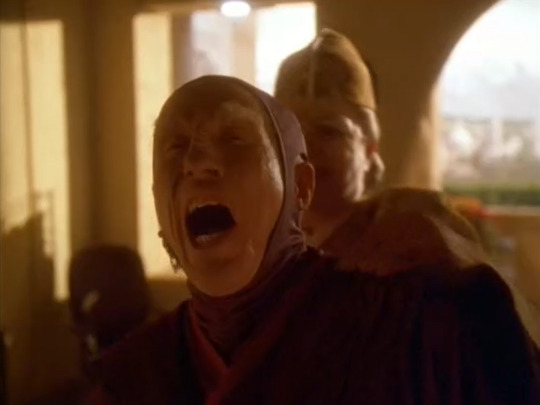
Don’t you recognize the face of your enemy?
May the Prophets bless Solbor for giving us such a great reveal scene in “The Changing Face of Evil.” He’s found out that Anjohl is actually Dukat, and Adami’s reaction to this news is so layered and cathartic that we love it. But that tippy top layer is a sense of self preservation that can only be maintained by murdering the hell out of Solbor, that gossip hound!
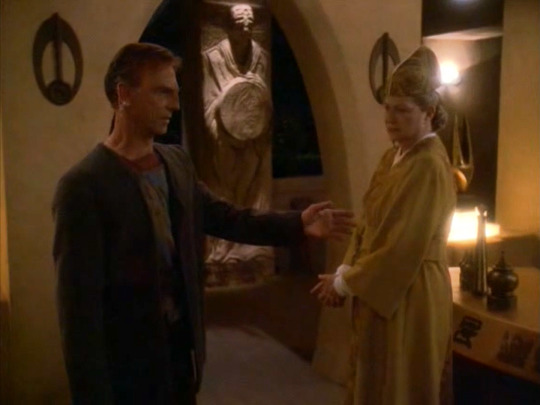
Hit it and quit it
But that isn’t as cold as Winn can get, as is proven in the next episode in “When It Rains…” after Dukat has gone blind from reading the Book of the Pah-wraiths. Winn cruelly kicks the blind Cardassian out on his ass to beg on the streets of Bajor. “You may return when you’ve proven yourself worthy and your sight has been restored,” she mocks, and it’s stone cold!
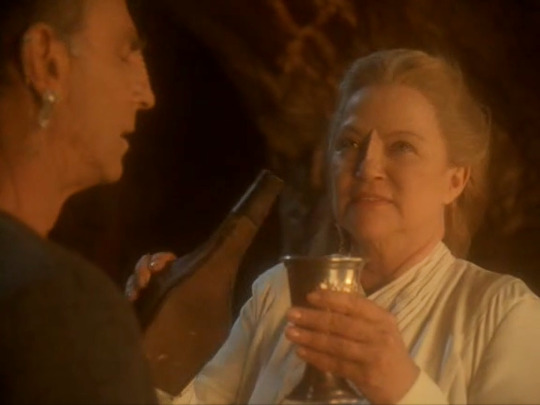
The Pah-wraiths demand a sacrifice
The whole series culminates in “What You Leave Behind” in the fire caves with Winn casting aside her devotion to the Prophets and summoning the Pah-wraiths. What she hadn’t told Dukat (with his sight returned for reasons) was that she lured him there to use him as the ceremonial sacrifice, and she righteously poisons his ass with absolutely no hesitation.

Too little, too late
Finally, Winn comes this close to redemption in “What You Leave Behind” when she comes to see the error of her ways (or maybe she’s just bitter that the Kosst Amojen picked Dukat’s husk over her). For the hottest of seconds (cause it’s the fire caves, get it?), she tries to get the book to Sisko when at last she has an epiphany moment, but her fate is ultimately sealed when Pah-wraiths toast her in flames.
—
What a journey for a character that only appears a handful of times, and we were here for every second. Next week, we’re continuing to give in the Pah-wraiths as we recount our favorite Dukat moments, which will surely be a trip. So keep your eyes here for that, keep following us through the Delphic Expanse as we watch through Enterprise over on SoundCloud or your favorite podcast place, praise the Prophets with us on Facebook and Twitter, and practice your “my child”s in the mirror.
#star trek#star trek podcast#podcast#deep space nine#kai winn#in the hands of the prophets#the circle#the collaborator#life support#shakaar#rapture#in the cards#the reckoning#'til death do us part#strange bedfellows#the changing face of evil#when it rains#what you leave behind#louise fletcher
20 notes
·
View notes
Photo

'Tis the Season: A Farm to Table by L. Dreamer
Bridgette Faul has made plenty of mistakes in her life, even one that landed her in prison. But now she’s a pillar of society as owner and operator of Dirty Hands Farm, an open to the public farm that employs ex-cons looking to make a life for themselves. At forty, she’s set in her ways and has her life just the way she likes it: organized and simple.
Olivia Predmore is an up-and-coming prosecutor who on the surface has the perfect life. She’s set to marry her long-time defense attorney boyfriend and become a criminal law power couple in the central valley of California.
But a chance meeting at Bridgette’s Dirty Hands Christmas Tree Farm has both women rethinking what, and who, they really want in life.
Genres: contemporary, romance
Get the book from Blackwell's with free worldwide shipping here!
21 notes
·
View notes
Text
Sean and Daniel should have been able to clear their name
Thinking about LIS 2 again and how unsatisfied I am about the endings.
None of the endings are good in my opinion.
Redemption is just soul crushing. Sean goes to jail for 15 years for a crime he didn't even commit. Sean’s life in Prison for 15 years would’ve been an absolute living hell. Not only was 15 years of his life taken from him, but he literally went through hell and there is no telling how brutal his time in prison could’ve been. Especially since he was labeled as a cop killer.
For a long time I believed the best endings were Parting Ways and Blood Brothers and thought Redemption did more harm than good. Now I feel like it's the opposite.
Escaping to another country sounds like a good plan, but there is something called extradition treaties; and the US & Mexico has had one for for a long time. More than likely US authorities are waiting on Daniel to turn 18 so that he can't use the "I'm a minor, you can't charge me" defense. No doubt the brothers are about to get raided as soon as Daniel turns 18. They either get to Cuba or they are going to lead a life constantly on the run as every continental country in Central & South America has an extradition treaty as well.
In the case of Parting Ways, Daniel will be under house arrest as they raid Puerto Lobos and extradite Sean while Daniel has to live under house arrest knowing there is nothing he could've done to save Sean.
And Lone Wolf has Daniel treated like a literal villain.
So unfortunately Redemption is the only ending where anyone is close to happy. Sean does his time to protect Daniel and sees Lyla again. Daniel lives a happy life in Beaver Creek and while Sean carries trauma with him, he gets to live and be free.
And don't get me started on how morality plays into the endings.
High Morality ending result in Sean either spending 15 years in prison or the brothers being separated in America. But the low morality ending results in the brothers together as criminals or Sean dead in Mexico? Why is staying in America painted as a moral ending, but choosing to stay in Mexico, the goal of the game is considered the immoral ending? Like, Mexico is not a guaranteed ticket to being a criminal. Wouldn't it make more sense for high morality to lead to Sean clearing his name? Very tone deaf DONTNOD.
But that out of the way, here is why we should've gotten the opportunity to gain the Diaz brothers freedom.
Redemption Ending, while tragic is a good ending. and it got me thinking afterwards about the actual legal implications of Sean's actions, and a 15 year jail sentence (shortened I assume for good behavior) seems quite extreme.
I imagine that it would be very difficult for the prosecution to prove without reasonable doubt that Sean killed the police officer in Seattle. If he surrendered immediately in Chapter 1, he could just say there was an explosion which knocked him unconscious and he doesn't know what happened. The police have no proof or physical evidence linking the death to Daniel and I imagine that any competent lawyer can get the brothers acquitted for the officer's death.
Now I know that Sean was just a kid who watched his father get murdered and panicked, so I understand why he ran, but running away made everything worse. By selecting moral choices, in the end my Sean was really on the hook for destroying the hotel room, grand theft auto, working on a pot farm, and trashing the police station (Karen took the blame for the church fire). I didn't assault the shopkeeper, didn't murder Lisbeth or Merril, and a 15 year jail sentence seems crazy to me and undermined what was otherwise a great ending.
So there are two ways I'd do this.
Having Sean go back after the conversation with Brody or contact Agent Flores when David suggests he turn themselves in.
Option 1.
In my opinion the game should've gave us two paths regarding what you say to Brody in episode 1.
Go to Puerto Lobos. Same game as before
Clear your name. After talking to Brody, he takes you to the police, but still stay at the motel. Sean tells Daniel the truth and in episode 2 is about Sean preparing for the trial. Daniel is sent to Claire and Stephen. Episode 3-4 is the trial and episode 5 is the conclusion. The smoking gun is Brett and Daniel, Brett revealing he was an asshole who got their father killed and Daniel revealing(privately) to the judge, Flores and lawyers his power. Sean is cleared and the choice would be
Return to Seattle
Go to Beaver's Creek
Go to Puerto Lobos
Option 2
Twos scenarios would be given to us. Continue the story we got or take David’s advice and make contact with Detective Flores and tell her he can explain everything. So we have a trial. Tell that their asshole neighbor Brett was harassing Daniel and Sean came to his rescue. After the fight ended badly, the officer came on the scene and explain that when Esteban was trying to defuse the situation, the officer shot their father and this set off Daniel’s powers and caused the incident. Shockingly, Brett is alive and comes forward as a witness. Telling everyone Sean and Daniel are telling the truth and that he was just being an asshole. Then Sean and Daniel requested a private audience with the judge, Agent Flores and the attorneys. Daniel displays his powers and Sean explains that when the officer shot their father it triggered his powers, went off in the hotel, pot farm and other unexplainable events. Everyone is in shock, but the judge requests everyone keeps this under wraps.
And it ends with the jury announcing. “We find Sean and Daniel Diaz Not Guilty” Sean cries tears of joy and embraces Daniel and Karen, Claire, Stephen and Lyla all come forward to hug Sean and Daniel. The Wolf Brothers are finally free.
Final ending would be between where we choose to go. Return to Seattle, return to Beaver Creek, return to Away with Karen or go to Puerto Lobos.
Flash forwards shows the brothers returning to Beaver Creek. Daniel growing up happily with Chris and Sarah Lee at his side and Sean reuniting with Lyla. In one of the flashes we would see a big Birthday celebration for Sean and we would see Sean, Daniel, Karen, Claire, Stephen, Chris, Jake, Sarah Lee, Lyla, Finn and Cassidy together celebrating Sean’s birthday. We would also see Sean and Daniel’s individual graduations. And as for the ending I guess we could have either Sean and Daniel living happily and free in Beaver’s Creek, Sean and Daniel returning to Seattle or Sean saying goodbye as he leaves for Puerto Lobos with whoever you romanced and if you romanced no one, Sean would leave with Finn, Cassidy or Lyla to Puerto Lobos(Parkaz is the hill I am dying on)
#Life Is Strange#Life Is Strange 2#Sean Diaz#Daniel Diaz#Lyla Park#Finn Mcnamara#Cassidy Jones#Karen Diaz#Karen Reynolds#Claire Reynolds#Stephen Reynolds#Chris Eriksen#Parkaz#McDiaz#Fean#Sinn#Sassidy
8 notes
·
View notes
Text
Hospital Hellhole

Where are the open windows in hospitals?
Hospitals are exactly like corporate cubicle farms, where you see the windows in your office, but theyre never open.
So, no fresh air ever gets in.
Stuffy, recirculated air with zero outside fresh air + constant either central indoor heating or air conditioning + a bunch of sick ass people stuffed into one building isnt exactly a recipe for holistic health.
Nor is it meant to be.
Its actually a veritable hotbed for communicable diseases, viruses, infections, germs and bacteria to develop, spread and grow.
Idgaf about how "well the hospital is ventilated" -- you need fresh air, jackass!
Good luck ever getting it at a hospital.
They'll just parade you around bare ass in a drab ass drag ass light blue gown that doesnt even close all the way in the back yet have the nerve to talk about how "functional" it is.
They'll parade your literal bare ass through the hospital hallways so you can "walk around" -- but nevah outside.
Yeah okay.
There are windows, why cant I open them?
Because you cant.
The air inside a hospital is endlessly recirculated, stuffy as hell and filled to the brim with germs, bacteria, viruses and pathogens given that a hospital is, y'know, a building full of sick ass people.
Who in the hell thinks this is a good idea?
Exactly noone as hospitals are designed to mentally break you, dehumanize you and give you a different illness then the one you checked in with or make whatever your current issue is worse.
Being in a building with no outside fresh air and no open windows full of sick, dying, dead, incapacitated, vomiting, diarrhea, coughing, sneezing, wheezing, bleeding people isnt supposed to make anyone else sicker?
Yeah okay.
You need fresh air even in the best of circumstances forget about when youre sick.
You need to be in nature as it literally heals us, even their studies confirm that.
You need fresh, unrecirculated air from outside.
You need the sky, the sun, the grass and the trees.
But what do you get?
A dark, drab, sterile, lonely room with a large ass loud ass TV in it, a phone, a bed that you will be stuck in for most of your stay, a bathroom and a window you cant open.
Sounds exactly like prison.
Being stationary -- unless you are a literal invalid or completely physically incapacitated -- is awful for you.
They know this.
They know that being stationary in bed can cause DVT (deep vein thrombosis), blood clots, embolisms, poor blood circulation and bloodflow, swelling, edemas, muscle atrophy, weight gain, bed sores.
Not to mention depression, lack of mental sharpness and acuity, lethargy, anxiety, fatigue, listlessness, hopelessness, dread...
Its almost like its by design, isnt it?
Hospitals should be near parks or be built inside of parks.
All patients that are literally physically capable of going outside for fresh air and natural sunlight should do so, or if possible, should be taken outside in wheelchairs.
Blinding white bright ass unnatural fluorescent lighting has repeatedly been proven to deplete our melatonin levels, disrupt our natural circadian rhythyms, disrupt our sleep, cause insomnia and other sleep disorders -- so why is the lighting in hospitals so fucking bright???
Why do you think?
They dont want you well.
If you happen to get better after being hospitalized, its an unintended side effect.
The goal is to find -- or make up -- other things that are wrong with you so they can feed you further into the many tentacled medical industrial complex.
More diagnoses, more pills, more injections, more shots, more IVs, more surgeries, more specialists, more tests, more false positive results.
Just the way they intend it.
If youve ever visited someone in the hospital or ever been hospitalized yourself, youve probably experienced a general feeling of feeling run down, fatigued, sore, tired, like you were coming down with a cold, feeling out of sorts and out of it if you were inside a hospital for a few hours or more (days, weeks or even months).
Thats by design.
Patients should be outside every day, breathing fresh air, getting natural sunlight, touching fresh grass, hugging and sitting by trees, looking up at the clear blue sky, soaking up the sun, picking flowers and soaking up natures natural healing properties.
Nope, you get to walk up and down a ridiculously overilluminated bright ass fluorescent hallway with drab muted colors surrounding you, machines beeping, nurses having bored conversations at lunch, doctors being self-important and your bare ass cheeks on full display in your gown that doesnt "quite fully close all the way in the back."
You should be letting butterflies land on your hand, picking sunflowers, laying against trees, walking barefoot in grass, staring up at the sun and soaking up the individual rays, taking deep breaths of the fresh air all around you, looking at the clear blue sky, observing some of the cloud formations, lying on your back on the grass and staring up at the big blue sky supervised by hospital staff for about an hour a day.
That should be happening every day in every hospital.
It could be done in shifts.
Even a small park or garden even on hospital grounds or property would suffice.
In your everyday life, dont you walk outside once a day?
Even just to check the mail? Run errands? Pick up groceries? Go to work? Get takeout? Go shopping? Go to work? Meet up with friends and family? Go out to eat? See a movie? Take a walk? Go jogging?
Why is this simple freedom denied to you in a hospital?
When you need nature the most, they wont even open a window for you.
Antiseptic sterility, vomiting bleeding dying patients, coughing sneezing wheezing patients, patients with viruses, bacterial infections, open wounds, bodily fluids and emissions, mucus, phlegm, stitches, sutures, transfusions, transplants.
How would you NOT need fresh air even after one day in a hospital?
Why is hospital food so comically bad?
Youre literally back to the slop you were being force fed in elementary school but as an adult.
Since youre sick, shouldnt there be an interest in providing you with nourishing, holistic, healthy, fresh organic foods that will help heal you and aid in your recovery?
If youve ever been hospitalized, it took you back to your school days with rubbery chicken, mystery lunch meat, dry bread, nothing is seasoned, everything is out of a box, warmed over and bland as hell.
Why?
It doesnt have to be expensive!
Fresh spinach for salad is cheap, quinoa is cheap, tofu is inexpensive, steel cut oats are inexpensive, chickpeas are cheap, hummus is inexpensive, lentil beans are cheap, kale is inexpensive, kidney and black beans are cheap - these are all chock full of protein, cheap, healthy, good for you and can be prepared with fresh or cookied veggies, rice, noodles.
It doesnt have to be like this.
They want you sick and defeated.
Hospitals are literal hellholes.
Its not you.
Youre right to think they are creepy depressing prisons and incubators for all kinds of diseases and infections.
Because they are. By design.
#oncology#cancer#chemotherapy#radiation#cancer cure#american cancer society#hospital#medical industrial complex#physician#do no harm#hippocratic oath#central heating#air conditioning#nature#heal yourself#holisticliving#vegetarian#vegan#quinoa#tofu#dehumanizes#authoritarianism#circadian rhythm#melatonin#garden#be free#inhumane#anti capitalism#socialism#natural cures
7 notes
·
View notes
Text
When Putin wanted the Central African Republic (CAR) to give him multiple gold and mineral mines in that resource-rich country, the first thing his agent, Yevgeny Prigozhin, did was to buy a radio station and start running propaganda about the benefits of the CAR creating closer ties to Russia.
Similarly, when Putin wanted to put Trump into the White House, he had Prigozhin’s Internet Research Agency — a massive, well-funded troll farm based in St. Petersburg — use swing-state polling and other internal RNC confidential information to send more than 100 million targeted Facebook impressions to swing state Americans.
Paul Manafort, Trump’s campaign manager in 2016 and a former employee who took over $10 million from one of Putin’s favorite oligarchs, handed that data off to Russian intelligence, leading in part to his going to prison (Trump pardoned him and is now talking about bringing him back into the 2024 campaign). Twenty-six of Putin’s IRA people were similarly indicted by the Mueller investigation, although American law has not been able to reach them in Russia.
Another example is Russia’s Putin and Hungary’s Orbán: in both cases, they used — just as Trump is promising to do here if he is reelected — libel laws to drive “normal” and progressive radio, newspapers, and TV out of business and replaced them with the equivalent of Fox “News” owned by friendly oligarchs, proclaiming the wonders of Putin and Orbán all day, every day.
3 notes
·
View notes
Text

Immigration
The images are frightening. We see caravans of migrants crossing Central America on their way to the United States. We see boats filled to the brim off the coast of Florida or in the Mediterranean. In border towns, we see hordes of young men on the streets, destitute, jumping the barriers of detention centres, living in squats, sometimes addicted to drugs.
European countries and the United States claim to be so overwhelmed that they delegate their borders to Mexico, Turkey and the countries of North Africa. They pay them to process asylum applications before the migrants have set foot in the destination country. The detention centres are inhumane and the migrants jump the barriers to get to their destination. The barrier is very easy to jump. Migrants enter countries illegally because it is inhumane to ask to enter legally. So they don’t assert their rights.
Faced with these terrifying images, we hear the Right telling us that these illegals must be punished more severely, and we hear the Left telling us that there are no problems with migrants. These migrants work for a tenth of the price and cannot assert their rights before a judge. The people most affected by migration are the rural and poor. The result of this situation of irregularity is to create an extremely cheap labour force that cannot compete with European or American labour. It is legitimate to feel helpless when faced with these migrants. The fields in the United States and Europe are full of illegal workers and the fields are not controlled. The current policy simply creates more scope for employers. The people living in rural areas are concerned, and only the right wing is addressing them.
In the short term, many migrants are arriving at the borders of the West and there is no reason why their treatment should not be organised in humane conditions. Those who wish to assert their right to asylum do not deserve prison.
In the long term, the European and North American powers have largely contributed to making the countries of the South unliveable. We must stop actively destroying these countries. Multinationals must be held criminally responsible when they commit an act in these countries that would be a crime in the West. They must be tried in the West for pollution, subversion, corruption, forced labour, child labour, etc. On the other hand, the West can and must support democratic regimes when they emerge in these countries. African revolutionaries have all been killed. This has to stop.
It is only under these conditions that development aid can be effective. If we give development aid when these conditions are not met, it feeds corruption. Only effective development aid will create decent living opportunities in these countries and reduce the number of migrants.
Taking stronger action on climate change is also important to ensure that these countries do not become hellholes.
If these countries end up receiving a fair income from their resources and labour, they will become long-term customers and trading partners and will be able to deal with the sanitary problems that threaten us all.
------------------------------------------------------------------
Peru, biodiversity in danger: https://www.aurianneor.org/peru-biodiversity-in-danger/
“How can you frighten a man whose hunger”…: https://www.aurianneor.org/how-can-you-frighten-a-man-whose-hunger-is-not/
Fair trade and organic farming: https://www.aurianneor.org/fair-trade-and-organic-farming/
How can we win back trust?: https://www.aurianneor.org/how-can-we-win-back-trust/
Humiliated by the Republic: https://www.aurianneor.org/humiliated-by-the-republic/
“Calais ou pas caler”: https://www.aurianneor.org/calais-ou-pas-caler/
Solidarité Hélvétique: https://www.aurianneor.org/solidarite-helvetique-democratie-semi-directe/
License on the Red Planet – A science fiction story: https://www.aurianneor.org/license-on-the-red-planet-a-science-fiction/
#agriculture#asylum#aurianneor#decent work#democracy#development aid#immigration#inequalities#justice#migrants#multinationals#no nonsense#pollution#prison#workers#impérialisme
6 notes
·
View notes
Text
COMPLETED
Webnovels on this list are officially finished (the author has confirmed the story is wrapped up and there are no plans to continue).
Anathema by chrysalis (superhero, sci-fi)
Two years ago, The Pulse—a sudden shift in Earth’s electromagnetic field—caused a global blackout and wiped a minute from mankind’s collective memory. This event introduced superhuman powers to our world. But the worst was yet to come.
Now two teenagers are caught in the chaos of a changing world:
Christina Chung, an antisocial misfit whose force fields are fueled by the social bonds she broke during the event of her transition.
Former coke addict Sarina Baumann, whose reality-altering power forces her to abandon everything she holds dear.
The two girls find themselves entangled with the renegade hero Radiant and the authorities that made him. The three must find a way—and a place—to be the heroes they’re destined to become. But sometimes, even the heroes fall…
Caelum Lex by khronos (space opera, sci-fi)
It’s a trying time in the central clusters of the galaxy. A shadow organization of powerful figures are tightening their grip to seize control, free planets are struggling to maintain their independence, and Leta Adler somehow ended up on a pirate ship.
This is Caelum Lex, a sci-fi space opera following the crew of the Dionysian (the irony of the name is not lost on any of them) and its mission to stay afloat in a Span ever more trying to shoot it down.
Join Leta, a not-so-sheltered-anymore doctor with a mission of her own, the captain she can’t stop butting heads with, his engineering genius of a brother, and the whole crew as they traverse the trials and tribulations of the universe, the mysterious Society, and each other.
Domina Urbana by DeathIsSilver (supernatural, urban fantasy)
Domina City. “The City of the Lady.” Built on a trash island in the West Atlantic by the labor of white-collar criminals, paid for by the United States and the Vatican, Domina was meant to be a beacon of hope and prosperity. A test, proving that criminals could be put to a better use than clogging up prisons.
Thirty years after building started, Domina is a blight on the face of the world, soaked in the blood of millions. Death is a fact of daily life. Gangs rule by no other than law their own strength, and entire cultures have arisen built on legends. Angels, demons, vampires and more fight each other for money and control. The fey release their monsters on the streets for no reason other than their own amusement, and bystanders are always caught in the crossfire. Every living soul in the city is a killer.
But even so, life goes on. People go to work, fall in love, raise families. The city grinds away, and the people survive.
Into this maelstrom of chaos comes Adam Anders, a young man trying to go to college with his friend. He has no idea what he has just stepped into. But then, Domina is in for a few surprises as well…
The Dream Quest of Henry Sinclair by Tony Maravilla
The year is 199W and Henry Sinclair is a young magic practitioner on the cusp of entering high school. Before he goes, he must undergo a quest, a coming of age journey to be seen in the eyes of his witch clan. He will journey into the Dreamlands, a world less real than his own, where he will meet fictional characters come to life, Dream Lords, djinni, dinosaurs, and his own dark reflection. Will he make it back home unscathed?
Familiar Thing by Den Page (romance, urban fantasy, queer)
Quentin thought that that thing where you write on skin and recite a litany was just a weird thing nobody but him and his abusive ex liked. Now it turns out that there’s a whole community, and that he can channel power for actual magic. He manages to find Henry, a magic partner that shares his interest in nonsexual magic - but of course then Quentin starts falling for him…
The Five Dollar Mail by Regina F. Shelley (historical romance, adventure)
Five dollars to mail a letter seems like a lot of money to shy farm girl Lily McMillian. And when she's hired in the spring of 1860 by Old Man Lynch as a cook for his stagecoach and Pony Express station, she finds out why it's so expensive.
Dropped into a whirlwind of rowdy men and boys, fast horses, and frightening conflict, she inherits more than a busy kitchen and a pile of dirty laundry. She gains an unlikely band of brothers, a motley collection of rounders, miscreants, and troublemakers, all of whom are in sore need of someone to keep them in line.
The Last Skull by The Great Hippo (superhero)
The Last Skull is a teenage superheroine fantasy mixed with what I hope is a realistic (but still comic-rooted) touch. I started writing it out of a mixture of love for the genre, a desire to see a muscular, wolverine-esque teenage girl beating the snot out of costumed supervillains, and a burning need to write something, anything before I went mad.
Magicacademy by MusedMoose (fantasy, slice of life)
Arts Magika University: sorcery classes, elven professors, dwarven fraternities, interspecies dating, and magikal duels. It's odd, it's mildly bizarre, and it's a wonder the students get any studying done. It's college the way it should have been.
Pact by Wildbow (supernatural, drama)
Blake Thorburn was driven away from home and family by a vicious fight over inheritance, returning only for a deathbed visit with the grandmother who set it in motion. Blake soon finds himself next in line to inherit the property, a trove of dark supernatural knowledge, and the many enemies his grandmother left behind her in the small town of Jacob’s Bell.
A Practical Guide to Evil by erraticerrata (YA, fantasy, dramedy)
The Empire stands triumphant.
For twenty years the Dread Empress has ruled over the lands that were once the Kingdom of Callow, but behind the scenes of this dawning golden age threats to the crown are rising. The nobles of the Wasteland, denied the power they crave, weave their plots behind pleasant smiles. In the north the Forever King eyes the ever-expanding borders of the Empire and ponders war. The greatest danger lies to the west, where the First Prince of Procer has finally claimed her throne: her people sundered, she wonders if a crusade might not be the way to secure her reign. Yet none of this matters, for in the heart of the conquered lands the most dangerous man alive sat across an orphan girl and offered her a knife.
Her name is Catherine Foundling, and she has a plan.
Symbiote by farmerbob1 (sci fi, speculative)
It’s something of an exploration into human/machine singularity or transhumanism. I explore my own ideas about how a moderately-educated individual would react to sharing a body and headspace with an advanced AI, and how they might grow together.
A Traveling Mage's Almanac by Loaka of the Wind (fantasy, adventure, furry)
Yenna Bookbinder loves learning magic. As a teacher of the Arcane, she has helped countless students to become mages—yet the world outside her classroom beckons to her.
When a band of adventurers comes through town as part of a grand expedition to parts unknown, she finds herself offered a position on the crew as the party’s mage. Leaving behind her old life for exciting days on the road, Yenna travels with new allies to uncover all manner of magical mysteries.
Between uneasy alliances, ancient dark magic and a plot that threatens to swallow the expedition whole, Yenna Bookbinder’s discoveries may shape the future of magic irrevocably—but will she live to see her findings published?
Twig by Wildbow (historical, fantasy, speculative)
The year is 1921, and a little over a century has passed since a great mind unraveled the underpinnings of life itself. Every week, it seems, the papers announce great advances, solving the riddle of immortality, successfully reviving the dead, the cloning of living beings, or blending of two animals into one. For those on the ground, every week brings new mutterings of work taken by ‘stitched’ men of patchwork flesh that do not need to sleep, or more fearful glances as they have to step off the sidewalks to make room for great laboratory-grown beasts. Often felt but rarely voiced is the notion that events are already spiraling out of the control of the academies that teach these things.
It is only this generation, they say, that the youth and children are able to take the mad changes in stride, accepting it all as a part of day to day life. Of those children, a small group of strange youths from the Lambsbridge Orphanage stand out, taking a more direct hand in events.
Twisted Cogs by Malcom Hemmings (superhero, historical, fantasy)
It is the turn of the 16th Century, and the world has entered a golden age of art, invention, and architecture. This renaissance of literature and learning in Europa is suddenly thrown into overdrive when a chosen few “Stormtouched” begin displaying supernatural abilities. Torn between the age’s burgeoning love of science and the dark promises of magic, Europa has become a powder-keg of clockwork and sorcery.
Elena Lucciano doesn’t care about increasing mankind’s knowledge or exploring the mysterious workings of magic. Even though she herself is Stormtouched, Elena doesn’t have high ambitions. All she wants is for her mother to be proud of her, for her teacher to accept her, and to become one of the best artists in all of Italoza, content to ignore all thoughts of science and magic.
Unfortunately for Elena, the tides of invention and magic are sometimes not content to ignore those who ignore them…
An Unauthorized Fan Treatise by Lauren James (mystery, crime)
Gottie is a fangirl for Loch & Ness, a TV show about paranormal detectives. She’s convinced that two of the male actors are secretly dating, and she’ll stop at nothing to prove it. When her online investigations accidentally uncover far more than she expects, she becomes complicit in secrets beyond just a romantic conspiracy theory.
An internet thriller told in a ‘true crime’ style recollection of events, the novel includes social media extracts such as modern Tumblr posts and early-noughties LiveJournal blog entries.
World Domination in Retrospect by Psycho Gecko (superhero, dark comedy)
Tell me something… do you root for the bad guy? Is an evil laugh a work of art for you? Do masks count as casual wear? Do you enjoy beating PETA members to death with baby cows? Do you have trouble fitting both testicles in your thong? Do you sometimes find yourself using the phrase “quake in buttery fear”?
If you answered yes to any of those, this might be the place for you. Except for the thong thing which could be dangerous if people start writing Dr. Seuss erotica. This is still the place for you, but I can provide little relief for you from this dimension.
Yeah, another dimension. Lucky you. A dimension of sight. A dimension of sound. A dimension of smells. Bad smells. Freaky smells. Anal smells. Smells you don’t have to sniff because you’re not here, man! Luckily for you, I, the Great and Devious Psycho Gecko, have acquired a device allowing me to share my adopted dimension with you. Let my eyes be your eyes. My ears be your ears. My fists be your fists. My sphincter be your sphincter. Friends, Romans, countrymen, lend me your rears!
Now sit them right down in that chair every Wednesday and Sunday and enjoy a trip through life with an unrepentant, murderous supervillain. You were expecting a heroic figure forced down a dark path, fighting to be a good man despite society forcing him into evil acts? Well cut that shit out right now. Tie up your kiddies in the other room and hold on to your sphincters. It’s time for World Domination in Retrospect!
Worm by Wildbow (superhero, drama)
An introverted teenage girl with an unconventional superpower, Taylor goes out in costume to find escape from a deeply unhappy and frustrated civilian life. Her first attempt at taking down a supervillain sees her mistaken for one, thrusting her into the midst of the local ‘cape’ scene’s politics, unwritten rules, and ambiguous morals. As she risks life and limb, Taylor faces the dilemma of having to do the wrong things for the right reasons.
2 notes
·
View notes
Text
By Lucian Kim, a global fellow with the Wilson Center in Washington and NPR’s former Moscow bureau chief.
When I saw the first images of armed men in ragtag uniforms taking over the Russian city of Rostov-on-Don on Saturday morning, I was immediately reminded of the “little green men” who began showing up in cities in Crimea and eastern Ukraine in 2014. Like the Russian troops and soldiers-of-fortune who began the Kremlin’s covert invasion of Ukraine, the fighters in Rostov displayed no insignia as they seized key buildings, including the headquarters of Russia’s Southern Military District. Just as in Ukraine nine years ago, there was no resistance from local law enforcement officers, who chose life over a fight with determined gunmen.
This weekend’s lightning takeover of Rostov by the Wagner mercenary group was the first step in an armed mutiny led by Yevgeny Prigozhin, the ex-con who rose to become Russia’s most infamous battlefield commander. From there, the Wagner forces began a march on Moscow until Prigozhin abruptly ordered his men to turn around and return to their bases. In the space of 24 hours, the full madness of Vladimir Putin’s dictatorship was on display. The blowback of his attack on Ukraine was symbolized by a Wagner tank, marked with the letter “Z,” which stands for the Kremlin’s war effort, pointing not at Ukrainians but other Russians.
Prigozhin said his beef was with the military leadership, which he accused of trying to destroy the Wagner Group. He has a history of publicly insulting Russia’s defense minister, Sergei Shoigu, and the chief of the general staff, Valery Gerasimov, and getting away with it. But Prigozhin’s open show of arms on Russian soil sent a challenge to the Kremlin that Putin could no longer ignore. In a televised address, the Russian president called Wagner’s mutiny a “stab in the back” and warned of civil war. Putin even invoked the violent collapse of the Russian Empire in World War I, though he did not mention Tsar Nicholas II, the disgraced ruler murdered by Russian revolutionaries.
There is another similarity to World War I that Putin did not mention: corruption and incompetence in the Russian military, as well as the inhumane treatment of its own soldiers. Anger with Russia’s top brass has not been limited to Wagner, and Prigozhin’s rage may well extend to the ranks of the Russian military. At the very least, that Prigozhin’s army was able to travel hundreds of miles unhindered shows that the Kremlin lacks the wherewithal to put down a domestic rebellion, especially when its best troops are fighting in Ukraine.
Despite the drama of the situation, a mutiny by Russia’s scariest people should not come as a surprise. The Kremlin allowed Prigozhin to recruit in prisons, which filled Wagner’s fighting force with desperate convicts. Prigozhin has long been the Kremlin’s man for dirty deeds, from interfering in the 2016 U.S. presidential election with his so-called troll farm to fighting undercover in Ukraine, Syria, and the Central African Republic. The Kremlin could deny any connection to Prigozhin, and Prigozhin, of course, denied hiring trolls and warriors. When an unknown number of Wagner contractors in Syria were killed by U.S. forces in 2018, the Kremlin response was muted, since officially they were not members of Russia’s armed forces.
It’s likely that Putin originally imagined Wagner as a Russian version of Blackwater, the U.S. private military contractor that came to prominence in the Iraq War. Wagner mercenaries in Syria and Africa played the part, wearing baseball caps and wraparound sunglasses while toting serious guns. When Russia launched its full-scale invasion of Ukraine last year, Prigozhin stepped out of the shadows to claim ownership of Wagner—and credit for its costly victories. A sledgehammer became the unofficial symbol of the Wagner Group after Prigozhin said one of his fighters had been executed with the tool as punishment for switching to the Ukrainian side.
For Putin, the Wagner mutiny is a self-inflicted wound, the result of his suicidal war against Ukraine. Putin could have chosen to stay on the track of a middle-income economy, with oil and gas exports to Europe guaranteeing enough money to sate his cronies, repress his enemies, and keep the rest of the country quiet, if not happy. Yet the longer he stayed in power, the less interested Putin became in being remembered simply as the leader who stabilized Russia after the collapse of the Soviet Union. That was not enough. Putin wanted the legacy of restoring an empire, beginning with Ukraine.
At first, the mission of the “little green men” he sent into eastern Ukraine was to turn the country into a failed state by embroiling it in a perpetual, low-level war. But Ukrainians defied Russia, and even after the 2022 invasion, they rallied to their country’s defense and did not let it collapse. Though battered and bloodied, Ukraine is unified and clear about its purpose. Now Russia looks like the failed state. Nobody in Russia understands what the war in Ukraine is about. And after Prigozhin’s rebellion, nobody knows if that war might not still come to Russia. Who will defend Putin? And who will go for Prigozhin?
Under an agreement brokered by Belarusian leader Alexander Lukashenko, charges against Prigozhin will be dropped, and he will be allowed safe passage to Belarus. But the deal hardly eliminates the threat that Prigozhin—or someone like him—poses to the Kremlin in the future. It is unclear if we are witnessing the beginning, middle, or end of Putin’s end. What is certain is that it is the final chapter of his rule.
6 notes
·
View notes
Text

"ESCAPED PRISONER TAKEN IN ROCHESTER," Toronto Globe. September 10, 1913. Page 8.
----
Albert Smith's Two Years of Freedom at an End
---
HE MAY BE DEPORTED
----
Man Arrested Across the Line Found to be Wanted Here for Escaping From Guelph Prison Farm in 1911.
----
Word has been received by the police here of the arrest in Rochester, New York, of Albert Smith, alias Albert Clarke, who is said to be wanted for escaping from the Central Prison Farm at Guelph on September 2, 1911. Chief Constable Grasett asked the authorities at Rochester that the man be deported, as it is not possible to extradite him on a charge of breaking prison. An order for deportation is expected to be received at Rochester from Washington in a few days.
The sentence that Smith was serving before he escaped was for a short term. He had been sentenced along with "Red" Mulhall of Toronto, who escaped at the same time as he. Mulhall was recaptured a short time later in Toronto.
Smith was arrested on August 29 by two Rochester detectives on charge of vagrancy. He was living in a lodging-house in Court street with Frank and Stella Wilson, who were also taken into custody by the police. After investigating, the Captain of the Rochester detectives learned that Smith was wanted here for breaking from custody.
Awaiting Deportation Order.
The case was turned over to Immigration Inspector Martin of Rochester, who at once communicated with the Department of Labor at Washington. Because of the fact that Smith has no money to test the Immigration laws, it is expected that soon he will be received back by the Central Prison.
Dr. J. T. Gilmour, Warden of the Central Prison, when spoken to by The Globe last night said that he could not remember the occasion of Smith's escape, as it is said to have been two years ago. In that time there have been twenty-live successful escapes from the Prison Farm at Guelph, while upwards of 2,700 prisoners have been handled. Accordingly the escapes have been less than one per cent. of the total number of prisoners handled.
#rochester ny#escaped prisoners#prison break#guelph reformatory#deportation from the united states#central prison farm#wanted fugitives#notorious criminals#crime and punishment in canada#history of crime and punishment in canada
0 notes
Quote
There’s an anecdote that Ruth Wilson Gilmore likes to share about being at an environmental-justice conference in Fresno in 2003. People from all over California’s Central Valley had gathered to talk about the serious environmental hazards their communities faced, mostly as a result of decades of industrial farming, conditions that still have not changed. (The air quality in the Central Valley is the worst in the nation, and one million of its residents drink tap water more poisoned than the water in Flint, Mich.) There was a “youth track” at the conference, in which children were meant to talk about their worries and then decide as a group what was most important to be done in the name of environmental justice.
Kuchner, Rachel (2019) Is Prison Necessary? Ruth Wilson Gilmore might change your mind. New York Times 17 April 2019. (9 pages) Non-NYT/reposted verison here.
I used the non-NYT/reposted version via Introduction to Abolition: 2018-2021 reading list. There is an updated page for 2022 too. Either way Abolitionist Futures offers so much to discover.
The quote sets up the anecdote, but it’s so worth it to click through to read if you haven’t read or heard it before. The story is one I think of when am feeling jaded.
8 notes
·
View notes
Text
Kandarin layout
Ahhh kandarin, one of the largest, content rich areas of Runescape.

It is also a massive relic of Runescape 2003 design. Much of the layout hasn't been touched since RSC and to be fair I'm fine leaving most of it alone, hell in runescape 3 it looks basically the same aside from the addition of the player owned farm.
But there are some areas that are so wonky or unrepresentative of lore significance that I'd really like to see them touched up or redone completely. Today I've whipped up my own sketches for what they could look like with a bit of quick photoshopping.

Port Khazard, the diplomatic haven of the Mahjarrat General Khazard. It's sort of hard to tell what the town even is here. It's sort of just the fight arena hanging out in the middle of nowhere with the port stuck next to it. It's also incredibly close to the last gnome settlement of central Kandarin, which they are constantly embattled with. Luckily for everyone involved khazard's troops choose to fight them at the designated BATTLEFIELD north of the village as opposed to say, throwing bombs directly over the hedge maze next to their tavern. The gnome maze even has an exit directly next to this tavern, perhaps they keep this for strategic access to booze.
Aside from the positioning the Khazard town has no sense of thoroughfare, there's no paving or "town center" that isn't a gated off Colosseum. Heck the Port, theoretically where most activity and services would be centered, doesn't really have direct access to the town, it's sort of inconvenient to walk around the whole fight arena to access the town's only two general stores.
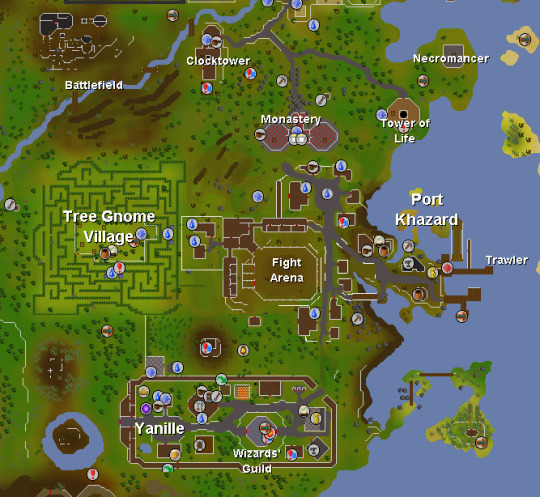
My suggestion here is to turn the whole town into more of a "Port Town" It's still a pretty cluttered design but I think it has a natural sense of being more navigable than just a bit rectangle with buildings placed around it. Most of the buildings are moved to center around a main road with direct access to the port (which I also repaved) and i've rotated the fight arena so the prison cells are a bit more out of the way. I also added a little town square in the north, where I imagine a big statue of Khazard stands. (this is also where the tavern would now be but i forgot to put the beer icon)
The town also puts a bit more respectful distance between it and the gnome village, however a well fortified barracks still remains for tactically observing their defensive neighbors. The main entrance to the port has also added a bit of battle scars.
You may also notice the awkwardly placed NMZ is missing, I'll get to that next!

The Temple of Ikov, Sorceror's Tower, Ranging Guild, Legend's Guild forest. There was plenty of land up for grabs here so it seems like everyone just set up shop wherever they could. For anyone who's done the temple of ikov quest you also know one of the most powerful artifacts in all of runescape and the last sect of Armadyl Knights is just below that dungeon marker.

This is sort of the opposite treatment this time, I wanted this area to seem LESS lived in, so that such a big amazing secret made more sense to keep here. Instead of a random rectangle, the temple of Ikov is now in the ruins of a large tower, with several rows of ruins emanating out from it. The sorcerer has moved into an opposite tower near the temple, perhaps another ruined tower emanating with energy. Our sorcerer friend has also taken up another responsibility, now housing the nightmare zone within their tower somehow.... idk it just fit I guess. I don't really like NMZ honestly I sorta wish it'd just get removed so i was willing to stick it anywhere.
Also the Ranging Guild is now in deep wilderness or whatever who cares.
6 notes
·
View notes
Text
My 2022 film ranking:
1. Roald Dahl’s ‘Matilda’ – The Musical (AKA ‘Booksmart’) – [Musical] A highly intelligent child starts primary school and confronts the evil headmistress. I’ll get this out of the way, the sight of precocious children jigging about like they’re in a TikTok makes me nauseous. Otherwise, M:TM is perfect, thanks mostly to Dahl’s charming story and Tim Minchin’s wonderful songs. Director Matthew Warchus leans into stylisation, bringing colour and magic that puts more ‘grounded’ musical directors like Tom Hooper to shame. Emma Thompson chews the scenery as the child-phobic Trunchbull, and Alisha Weir holds it all together as the cute and capable heroine. For fans of Paddington.
2. The Lost Daughter (AKA ‘Mamma Mia! But Sad’) – [Drama] While on a solo holiday to Greece, Leda meets a young mother who reminds her of her own struggles as a parent. This could have been a slow burn, but an early reckless choice by the protagonist infuses the film with simmering tension. It’s a great character study, and director Maggie Gyllenhaal gets brilliant performances from Buckley and Colman as the quietly abrasive Leda, who’s unpredictable without seeming inconsistent. I like Gyllenhaal’s use of quick edits and closeups to deliberately disorient the viewer, as well as Dickon Hinchliffe’s score which swings from melancholy to upbeat, ensuring things never get dull. For fans of Fleabag.
3. The Quiet Girl (AKA ‘All Quiet On The Girl Front’) – [Drama] A young girl is sent away from her neglectful family to stay with kindly relatives for the summer. I wasn’t initially sure where the story was going to go, given this starts where most adoption stories end. But I realised very soon that it was about the journey, not the destination. The direction’s subjective, showing you the world from a child’s perspective while still providing insight to the adult characters. The ending’s wonderfully bittersweet and, most impressively, it’s a tight 90 minutes. For fans of Goodnight Mr. Tom.
4. Glass Onion: A Knives Out Mystery (AKA ‘Janelle Monáe, Janelle Problems’) – [Murder mystery] Eccentric detective Benoit Blanc is summoned to a Greek island to solve the ‘murder’ of a tech billionaire. It’s only a prolonged an uneventful first act that keeps this from reaching the perfection of ‘Knives Out’. After the mid-point gamechanger, Rian Johnson provides wall-to-wall payoffs that satisfyingly recontextualise previous clues and red herrings. As for Benoit Blanc, I thought he worked better as a co-lead with Ana De Armas than in his more central role here, but he’s still extremely charming. For fans of the end of Prisoner Of Azkaban.
5. All Quiet On The Western Front (AKA ‘Insert Hilarious WW1 Gag’) – [War] In the final months of World War I, a naïve German recruit enters the meat-grinder of the Western front. It's the sort of thing you only want to watch once, like '12 Years A Slave'. With hand-held direction that puts you at the heart of the action and nightmarish gore worthy of a horror film, AQOTWF is experiential filmmaking at its best. You could have lost the Armistice subplot and cut things down to a lean 100 minutes, but the prospect of a ceasefire lends extra pathos to the lives taken in the final hours of the war. For fans of 1917.
6. Ali & Ava (AKA ‘Disc-eo & Folk-iet) – [Drama] An EDM-loving landlord and a folk-loving teaching assistant find common ground. Director Clio Barnard finds magic in the drizzle and concrete of Bradford. There’s some great use of symbolism: a glance at a rocking chair or a pair of boots can tell you everything you need to know about a character. Her script deals with a lot of different issues (a few too many), and maybe should have zeroed in on the themes of mental health and the power of music. For fans of Ken Loach
7. Nope (AKA ‘Cowboys Vs Aliens’) – [Sci-fi/horror] Two siblings attempt to save their family business by capturing footage of the UFO terrorising their farm. It’s been a long time since I last said “Oh my god” out loud in a cinema (I’m British). ‘Nope’ takes a bit of time to get started, but once things kick off in earnest it’s a real thrill. The second act in particular is terrifying, thanks to a genuinely hard to watch scene of Lovecraftian horror. There are a few odd choices, like the distractingly gravelly director character who’s introduced too late to be properly characterised, but otherwise I’d say that Jordan Peele’s done it again. EDIT: Oh yeah, what was the deal with the floating shoe? For fans of Steven Spielberg.
8. Doctor Strange In The Multiverse Of Madness (AKA ‘The Power Of The Doc’) – [Superhero] A sorcerer has his ex-girlfriend’s wedding interrupted by a multiversal war. This was really entertaining! The action was occasionally hard to follow and the plot, while coherent, was little more than a vehicle for increasingly bizarre set pieces. But what set pieces! I know MCU directors often feel handicapped by studio interfering but, in this case, it seemed like Sam Raimi was able to make the film his own by leaning into the goofy soft-horror he’s best known for. And the, now obligatory, fan-service cameos were wisely confined to one scene. For fans of Sam Raimi.
9. Everything Everywhere All At Once (AKA ‘Racocoonie’) – [Sci-fi/action] A laundry owner has her tax audit appointment interrupted by a multiversal war. Co-directors ‘Daniels’ should be applauded for their boundless creativity, though I do have notes. There’s an incredible 100 minute film in there somewhere, but many moments dragged out for way too long. EEAAO rises above other Matrix knockoffs by remembering to have fun, with plenty of ‘Rick & Morty’-style comedy to complement the competently handled emotional story. By turns surreal, hilarious, tedious, and genuinely moving. And too long. For fans of Rick & Morty.
10. The House (AKA ‘There’s A Moose Loose Aboot The Hoose!’) – [Adult animation] Three generations of cats, mice, and humans try their best to settle into ‘the house’. I mean, I just love stop motion so maybe this had an unfair advantage. Design and direction are both on point to make ‘The House’ as beautiful as it is unsettling. Thematically though, it suffers from ‘French Dispatch syndrome’: with neither the variety of an anthology miniseries like ‘Inside Number Nine’, or the coherence of a standard 90-minute film. The first and last parts had decent messages, but I never felt like Jarvis Cocker’s mouse estate agent was getting his just deserts. For fans of Henry Selick.
11. The Power Of The Dog (AKA ‘Doctor ‘Straight’ In The Closet Of Sadness’) – [Drama] A macho cattle-rancher takes against his brother’s new wife and her aloof teenage son. I thought Jessie Plemons’ understated performance was the highlight. His tearful relief at finding an alternative to his bullying brother really struck a chord, and it’s a shame that he faded into the background later on. The actors convey a lot through physicality, like Dunst’s shaking hands as she sits at the piano, or Cumberbatch and Smit-McPhee’s gait as they respectively strut and mince around the farm. Dialogue schmialogue. For fans of There Will Be Blood.
12. RRR (AKA ‘Rajamouli’s Ridiculous Romp’) – [Action] Sparks fly in 1920s India when officer A. Rama Raju meets the revolutionary Komaram Bheem. They don’t make films like this in the West any more, and I think that’s a shame. RRR is camp and earnest, always somewhere between ‘so bad it’s good’ and just genuinely good. While there were literally hundreds of moments of unintentional comedy, I couldn’t help but get swept up in the epic drama and spectacle. For fans of Stephen Chow.
13. See How They Run (AKA ‘Who Has Done This?’) – [Comedy] In the 1950s, a murder is committed on the West End stage of Agatha Christie’s ‘The Mousetrap’. This was more enjoyable on the rewatch, with lowered expectations. Sam Rockwell's still wasted and the premise still isn't as original as it thinks it is. But the jokes (both verbal and physical) all land, the payoffs and reveals are satisfying, and the cast mostly live up to their potential. And Saoirse Ronan carries the whole thing, doing double duty as moral centre and comic relief. For fans of Inside No. 9.
14. Don’t Look Up (AKA ‘Leostorm’) – [Drama/comedy] Two astronomers desperately attempt to warn the world’s governments about an approaching comet. This was a really tense watch. It felt like a modern update of ‘Dr Strangelove’, where the people with the power to avert Armageddon are too inept to do so. There’s a hefty dose of Black Mirror in there too, with humanity’s stupidity on full display. That said, I didn’t leave feeling like we deserve annihilation, which might have been some consolation. Instead I was angry that we put our lives in the hands of the Musks and de Pfeffel Johnsons of the world, and that’s not as cathartic. For fans of Charlie Brooker.
15. The Banshees Of Inishirin (AKA ‘The Irishmen’) – [Drama] During the civil war, an Irish farmer is baffled to learn that his friend doesn’t like him any more. You can tell Martin McDonagh’s a playwright – the slow pace, the few locations, the focus on dialogue. And like most plays it gave me a lot to think about, whilst also being a bit boring. The jokes all landed but they were few and far between. It was like feature-length ‘This Country’ episode, but with more fiddles and misery. And Barry Keoghan was fantastic as ever, if typecast, as Dominic the village eejit. For fans of Samuel Beckett.
16. Turning Red (AKA ‘Meilin, Wailin’ & Big Fluffy Tailin’) – [Family animation] A thirteen-year-old girl turns into a giant red panda. I feel like, as with the MCU, Pixar films have somewhat reached a point of competent homogeneity. I could copy and paste most of this from my last two Pixar reviews: the animation’s beautiful; good insights are made about the human condition; the message is hindered by over-specific lore. And that’s fine, I guess. For fans of Luca.
17. Pig (AKA ‘Baken’) – [Drama] A former expert chef turned lonely truffle hunter searches for his stolen truffle pig. I felt like there could have been something profound going on in 'Pig'. The juxtaposition of a dirty, bleeding man sat in a fancy restaurant probably signifies… something. But there were just too many off-putting elements, like the random fight club scene, for me to grasp what it was all about. Cage does your standard 'Sadman McDeadwife' performance, but I much preferred Alex Wolff's nervous yuppie. For fans of John Wick… or Ratatouille
18. Prey (AKA ‘Nevertheless, Coman-she Persisted’) – [Sci fi/ action] A precocious young Comanche woman confronts an extra-terrestrial ‘Predator’. It’s such a shame this never got a theatrical release. The ‘Revenant’-style nature shots were amazing but would have been so much better on the big screen. It’s a lean 100 minutes and a little light on substance, meaning everything hinges on the action, which is… decent. The Predator’s kills are gleefully bloody, but the final fight is hard to follow in the dark, making it a bit of a limp climax. For fans of The Revenant.
19. The Batman (AKA ‘Twi-knight’) – [Superhero] Batman uncovers corruption in Gotham City while facing a serial killer known as the Riddler. Director Matt Reeves draws on the serial killer films of David Fincher, emulating their tone but unfortunately also their three-hour runtimes. I’m afraid I found The Batman to be heavy on plot and light on theme, leaving me with little idea of what it was ‘all about’. Paul Dano’s a brilliant actor but he’s only really given one scene and, sadly, I think he botched it. Still, I enjoyed the action, the cinematography and Michael Giacchino’s already iconic score. For fans of Seven.
20. Smile (AKA ‘Upside Down Frown Town) – [Horror] A psychiatrist is fatally cursed when she witnesses one of her patients committing suicide. This script really could have used another pass. The scares are effective but the premise is generic and the dialogue laughably bad, particularly the overuse of the f-word worthy of an A Level drama class. Worst of all, thematically it seems to come out against seeking help for mental health problems, an idea I thought it would subvert but then it just… didn’t. That said, there are a few brilliantly nightmarish images and an incredible score from Cristobal Tapia De Veer. For fans of It Follows.
21. Thor: Love & Thunder (AKA ‘Why, Waititi? Why?!’) – [Superhero] Thor teams up with ex-girlfriend Jane Foster to fight Gorr the God Butcher. I think Marvel Studios might be drunk on their own power. Indeed ‘Love & Thunder’ feels like it was written and directed while drunk. It brings back a lot of the elements that made ‘Ragnarok’ work, but underdelivers on both humour and pathos. Thor’s new multi-coloured costume is a huge downgrade from the streamlined look in his previous solo film, and Guns ‘N’ Roses can’t hold a candle to Led Zeppelin. For fans of Ghostbusters (2016).
22. Ennio (AKA ‘The Good, The Bad & The Long) – [Documentary] A documentary celebrating the life and work of Italian film composer Ennio Morricone. Honestly, I love Morricone but after two and a half hours I was sick of the old codger. Insights are made into the great man’s process but they’re drops in an ocean of runtime. I wish, instead of trying to cover every film Morricone ever composed, director Giuseppe Tornatore had just picked a few ‘greatest hits’. Or at least devoted more than 60 seconds to the scoring his own ‘Cinema Paradiso’. For fans of BBC 4 music documentaries.
23. The Worst Person In The World (AKA ‘Nor-way Home’) – [Drama] I’m sorry, so little happens in this film that I’m not sure that I can summarise it. My favourite part was finding out, to my relief, that my wife didn’t like it either. Perhaps I shouldn’t have had a couple of drinks before watching something where I’d have to read both subtitles and actors’ facial expressions. Either way, I mentally checked out after the first hour. TWPITW uses a prologue to establish Julie’s personality before instantly contradicting it, introduces numerous disparate plot elements that didn’t go anywhere (drugs, families, offensive cartoons) and has basically nothing happen for two hours. For fans of things that are shit.
And a dishonourable mention to The Lost King (AKA ‘Knowing M.E., Knowing You’), which Cate said it wouldn’t be fair for me to review because I walked out after 30 minutes. Also No Time To Die, which I couldn’t finish because my plane landed but was also pretty bad.
#my post#2022#2022 film#movies#ranking#matilda the musical#the lost daughter#the quiet girl#glass onion#all quiet on the western front#ali & ava#nope#doctor strange in the multiverse of madness#everything everywhere all at once#the house netflix#the power of the dog#rrr#see how they run#the banshees of inisherin#don't look up#turning red#pig movie#prey movie#the batman#smile movie#thor love and thunder#ennio the maestro#the worst person in the world#the lost king#no time to die
11 notes
·
View notes
Text
Beer and Clothing in the Occident
This post is a reference guide to the Occident, and a follow-up to a couple of previous actions. Much of it applies also to the colonies around the Pearl Sea.
It has been about 500 years since the founding of Azimuth and the beginning of the Sun-Divers as a race, from which events they number the years; the Prophetic Twins, 23 when the calendar was revealed, began it in Year -84. The 364-day solar year is perfectly harmonious with the 13 lunar months (28 days each).
Geography
The realms of civilisation in the Occident are:
The elevated but low-relief plateau of the West. Dominated by savanna, with tropical forests in river valleys and along the coast, and ruled by a crab-bucket of tribal oligarchies.
The relatively cool mountain highlands that run down the continent north/south. The mountains are covered in terrace-farms, the volcanic terrain being well-suited to wet rice cultivation. Cloud-forests, vertical archipelagoes.
The coastal hills of the east, dominated by city-states and little kingdoms. Cities tend to be built in the hills, with adjunct ports on the coast.
The seasonal northern peninsula and islands. Dry forests, more city-states.
The forested, swampy northeastern lowlands support support large (but disorganized) populations of Night-Singers, who generally live as swidden farmers or sedentary/semi-nomadic hunter-gatherers. They also practice shellfish aquaculture on bamboo frames.
The hills around the Red Lake and Azimuth, which mix traits of the highlands and plateau.

[Americas for scale and latitude.]
The climate of the Occident is not amenable to horses, though there are llamas in the mountains. In the plains, chariots are sometimes drawn by robust, omnivorous avians—mvao—which somewhat resemble secretary-birds.
Social Structure and Customs
The basic structuring unit of Sun-Diver society is the clan. The “Great Clans” are derived from the 364 pairings of the 728 [yes, this is a retcon] original Sun-Divers who descended from the Flowering Tree. (Not, of course, that everyone agrees on the names and identities of those individuals, or who is descended from whom, or whose clan-day is what. A number of competing systems exist.)
Little Clans, of which there are thousands, descend from the Great ones; they are exogamous (in some places, you must marry outside your Little Clan and within your Great Clan). Descent is generally patrilineal, with some regional variation. The human minority organizes itself along similar lines.
There is a simple four-part caste system, with noble clans, common clans, outsiders, and slaves. Outsiders, mostly night-singers, immigrants, and freedmen, do not share in the community of clans (though they can still attain high status), and slaves are alienated from it. Slavery is inflicted on prisoners of war, or as punishment for a crime or debt; legal details vary. It may be transmitted between reincarnations, but not to children. 20% of Sun-Divers belong to noble clans, and not all are de facto wealthy.
The relationship between oneself and one’s previous incarnations is not quite self-identity, but not quite parent-child.
Outside the Night-Singer heartland, the population ratio of Sun-Divers/Humans/Night-Singers is something like 70/15/15, with higher human populations in the north and the colonies (70/20/10 or similar).
Villages have headmen, typically elder (older and more-reincarnated) members of a locally-important noble clan.
Dwellings are long houses, normally raised and thatched, and arranged around a central crèche housing eggs and chrysalises. Bamboo is an important material in craft and building.
A terrible and notorious crime among them is to incise the chrysalis and drink the contents.
Clothing tends to be cotton, adorned by the nobles with dye and feathers. It also tends to be sparse, outside the high elevations. Long strings of glass beads or pearls are much prized.
Sun-Divers and Humans Classic in a given area speak mutually intelligible languages, despite the various alterations applied in Sun-Diver speech.
Warfare is a primarily male activity, though all members of a clan are armed and expected to fight to the death in defence of a crèche.
In this era, battle is conducted by masses of archers armed with bamboo longbows, bolstered by small corps of warriors armed as close fighters, along with elephants and mvao-chariots.
Food and Agriculture
Their staple foods are, necessarily, liquid, and thicker dishes are somewhat more difficult to consume (thickness, sugar, and alcohol content assume a place similar to capsaicin in their cuisine). As in all poor agrarian societies, consumption centers on fairly simple preparations of staple crops. The prototypical dish is a thin broth of grain or sugarcane, possibly with spices, salt, other minerals, or fermented material added before consumption. The other prototypical dish is beer.
They are lactose tolerant, and dairy products are extremely popular. They have a startling tolerance for sugar and alcohol, and fermentation features heavily. The aforementioned beer is common, as are sago wine and arrack. The diet is supplemented with certain minerals and mineral-rich plants (these being preferred to mud and dung, except in famine conditions). Meat is occasionally present, in the form of blood or via fermentation, broths, and purees, but plant proteins predominate. They have an inordinate fondness for tea.
Nectar and fruit juice are not plentiful enough to be staples, but their market gardens feature strains of flowers whose yield of nectar is several times better than can be found in the wild, and floriculture is much more prominent than in baseline human societies. Honey is also a popular delicacy, and the honeyguide revered.
Religion
Their literary centrepiece is The Course of the Sun, a semi-coherent corpus of texts revolving around the deeds and sayings of the Prophetic Twins, the events and conflicts of their progress to the west, didactic dialogues between gods and mortals, and various primeval and primordial human and divine conflicts.
Sky-gods with obvious commonalities and cognate names rule most of the continent’s religious systems. The Implacable Celebrants are the primary religious institution, loosely united by occasional regional gatherings, loyalty to Azimuth, and a shared self-understanding. Other major and minor gods are integrated into several coherent (and increasingly elaborate) cosmic schemas.
The peculiar lifecycle of the sun-divers generates religious innovations. Viz:
The Sky, bright-eyed, rainbow-haloed, the Changer of Days, is minister to the chrysalis and the soul-in-dissolution. He is depicted as male or epicene. His temples tend to be open to the sky. In their simplest form, they are round, walled courtyard-sanctuaries with some holy plant, idol, or other cult object bleaching in the sun; greater ones feature concentric ring-enclosures of richly-painted stone colonnades and gardens, each occulted from the last.
Thousand Wombs, Worm-Mother, patron of the vermiform, is interpreted as a protector of children. She is popular with midwives and in folk magic; furthermore, in the elaborated cosmic systems of the temple-schools, she embodies the "receptive principle", associated with children, fertility, and the retention of knowledge. She is invoked to sanctify oaths and marriages, but is always reticent to release her gifts.
And, should the eyes tire of colors, or the heart of glory, there are the obeisances of the Last God—appeased lest he look with too much jealousy on those souls whose sunward flight rescues them from his ultimate domain. Those soon to enter the chrysalis burn resins and sing hymns, and one day a year is set aside in Azimuth to avert his wrath: the public buildings sweat in garments of white linen, all work stops, the citizenry take cover in their homes, and the gaze of the Oracles from the Arboretum’s pinnacle bleaches every flower with the pallor of bone and chalk.
[Pretty much all the gods had cults in the original batch from out East, thought that was in the era of Velarie’s dormancy. These are just noted as salient Sun-Diver specific things.]
3 notes
·
View notes
Photo
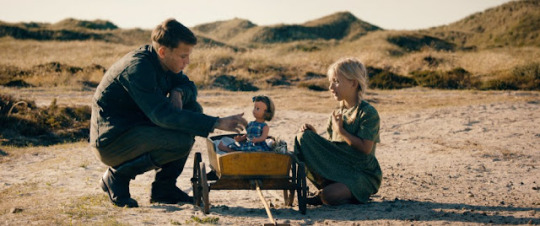
Emil Belton and Zoe Zandvliet in Land of Mine (Martin Zandvliet, 2015)
Cast: Roland Møller, Louis Hofmann, Joel Basman, Mikkel Boe Følsgaard, Mads Riisom, Oskar Bökelmann, Emil Belton, Oskar Belton, Laura Bro, Zoe Zandvliet. Screenplay: Martin Zandvliet. Cinematography: Camilla Hjelm. Production design: Gitta Malling. Film editing: Per Sandholt, Molly Malene Stensgaard. Music: Sune Martin.
The English title, Land of Mine, is an unfortunate but perhaps irresistible pun. The original Danish title was Under Sandet -- "Under the Sand" -- which lacks resonance with its central theme: the cruelty inflicted by victors on the vanquished. Land of Mine at least picks up on that theme, the patriotic urge to revenge one's country on those who attacked it, as well as indicating the action of the film, the defusing and disposal of land mines planted by the Germans along the Danish coast during World War II. It focuses on the Danish Sgt. Carl Rasmussen (Roland Møller), tasked with training and supervising a company of German prisoners of war who are the ones who do the terrifying work of locating unexploded mines along the seashore. When we meet Rasmussen, he is brutally beating a German soldier who has had the audacity to pick up a Danish flag as a souvenir, so the officers in charge of the land mine detail are fairly certain that he will be no softy when it comes to handling the POWs. It turns out that the prisoners are very young -- barely out of their teens, late conscripts into the German army in the waning days of the war. Rasmussen and the POWs are billeted on a woman who has a small farm near the shore, and who shares his hatred for the Germans, stinting on the food she is supposed to provide the young men. She also has a young daughter, who in her innocence bears no grudge against the men and happily plays with one of them until her mother sends him away. It's a situation full of suspense, of course, but writer-director Martin Zandvliet can't seem to stay away from the obvious plotting clichés. We know that there will be some sort of rapprochement between Rasmussen and his fresh-faced charges. When we see that two of the young men are twins, who have dreams of returning to Germany and using their bricklaying skills to help rebuild their country, we're pretty sure that one or both of them will have to die. The hard-bitten sergeant shows no affection to anyone except his dog, so we're certain that the dog's a goner. We're not surprised when the little girl wanders off into the minefield and has to be rescued by the Germans, causing a change of heart in the girl's mother. And so on to the end of the film, which is supposed to be heartwarming but really feels like a foregone conclusion, a working-out of the movie's moral vision. Forgiveness is a fine and necessary thing, but Land of Mine too often sacrifices the drama for the sermon, just as the intrinsic facetiousness of the titular pun undercuts the seriousness of the film's intent.
2 notes
·
View notes